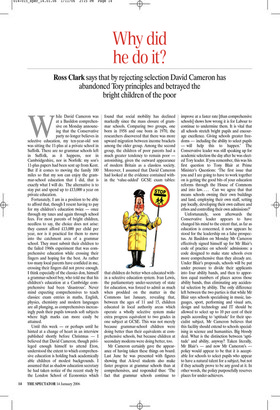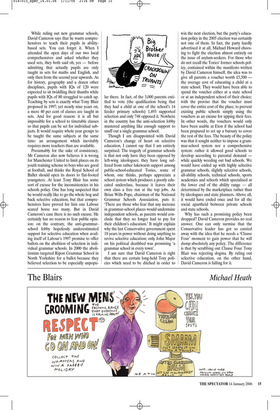Why did he do it?
Ross Clark says that by rejecting selection David Cameron has abandoned Tory principles and betrayed the bright children of the poor While David Cameron was at a Basildon comprehensive on Monday announcing that the Conservative party no longer believes in selective education, my ten-year-old son was sitting the 11-plus at a private school in Suffolk. There are no grammar schools left in Suffolk, as it happens, nor in Cambridgeshire, nor in Norfolk: my son’s 11-plus papers had been sent up from Kent. But if it comes to moving the family 100 miles so that my son can enjoy the grammar-school education that I did, that is exactly what I will do. The alternative is to stay put and spend up to £13,000 a year on private education.
Fortunately, I am in a position to be able to afford that, though I resent having to pay for my children’s education twice — once through my taxes and again through school fees. For most parents of bright children, needless to say, the choice does not arise: they cannot afford £13,000 per child per year, nor is it practical for them to move into the catchment area of a grammar school. They must submit their children to the failed 1960s experiment that was comprehensive education while crossing their fingers and hoping for the best. As rather too many local parents have confided in me, crossing their fingers did not prove enough. I think especially of the classics don, himself a grammar-school boy, who told me that his children’s education at a Cambridge comprehensive had been ‘disastrous’. Never mind expecting comprehensives to teach classics: exam entries in maths, English, physics, chemistry and modern languages are all plunging, as comprehensives increasingly push their pupils towards soft subjects where high marks can more easily be attained.
Until this week — or perhaps until he hinted at a change of heart in an interview published shortly before Christmas — I believed that David Cameron, though privileged enough himself to attend Eton, understood the extent to which comprehensive education is holding back academically able children of modest backgrounds. I assumed that as shadow education secretary he had taken notice of the recent study by the London School of Economics which found that social mobility has declined markedly since the mass closure of grammar schools. Comparing two groups, one born in 1958 and one born in 1970, the researchers discovered that there was more upward migration between income brackets among the older group. Among the second group, the children of poor parents had a much greater tendency to remain poor astonishing, given the outward appearance of modern Britain as a classless society. Moreover, I assumed that David Cameron had looked at the evidence contained within the ‘value-added’ GCSE exam tables: that children do better when educated within a selective education system. Ivan Lewis, the parliamentary under-secretary of state for education, was forced to admit as much when prodded on the matter in the Commons last January, revealing that, between the ages of 11 and 15, children educated in local authority areas which operate a wholly selective system make extra progress equivalent to two grades in one subject at GCSE. This was not merely because grammar-school children were doing better than their equivalents at comprehensive schools, but because children at secondary moderns were doing better, too.
Mr Cameron certainly gave the appearance of having taken these things on board. Last June he was presented with figures showing that A-level students also make faster progress at grammar schools than at comprehensives, and responded thus: ‘The fact that grammar schools continue to improve at a faster rate [than comprehensive schools] shows how wrong it is for Labour to continue to undermine them. It is vital that all schools stretch bright pupils and encourage excellence. Giving schools greater freedoms — including the ability to select pupils —will help this to happen.’ The Conservative leader was still speaking up for academic selection the day after he was elected Tory leader. If you remember, this was his first question to Tony Blair at Prime Minister’s Questions: ‘The first issue that you and I are going to have to work together on is getting the good bits of your education reforms through the House of Commons and into law.... Can we agree that that means schools owning their own buildings and land, employing their own staff, setting pay locally, developing their own culture and ethos and controlling their own admissions?’ Unfortunately, soon afterwards the Conservative leader appears to have changed his mind to the extent that, as far as education is concerned, it now appears he stood for the leadership on a false prospectus. At Basildon on Monday Mr Cameron effectively signed himself up for Mr Blair’s code of practice on schools’ admissions: a code designed to make state schools even more comprehensive than they already are. Under Blair’s proposals, schools will be put under pressure to divide their applicants into four ability bands, and then to apportion equal numbers of places across those ability bands, thus eliminating any accidental selection by ability. The only difference left between the two parties is that while Mr Blair says schools specialising in music, languages, sport, performing and visual arts, design and technology and IT should be allowed to select up to 10 per cent of their pupils according to ‘aptitude’ for their specialist subject, Mr Cameron believes that this facility should extend to schools specialising in science and humanities. Big bloody deal. What is the distinction between ‘aptitude’ and ability, anyway? Taken literally, Mr Blair’s — and now Mr Cameron’s policy would appear to be that it is acceptable for schools to select pupils who appear to have a natural talent for a subject, but not if they actually prove to be any good at it. In other words, the policy purposefully reserves places for under-achievers. While ruling out new grammar schools, David Cameron says that he wants comprehensives to teach their pupils in abilitybased sets. You can forget it. When I attended the open days of our two local comprehensives and asked whether they used sets, they both said oh, yes — before admitting that actually pupils are only taught in sets for maths and English, and only then from the second year upwards. As for history, geography and a dozen other disciplines, pupils with IQs of 120 were expected to sit twiddling their thumbs while pupils with IQs of 80 struggled to catch up. Teaching by sets is exactly what Tony Blair proposed in 1997; yet nearly nine years on, a mere 40 per cent of classes are taught in sets. And for good reason: it is all but impossible for a school to timetable classes so that pupils can be set for individual subjects. It would require whole year groups to be taught the same subjects at the same time: an arrangement which inevitably requires more teachers than are available.
Presumably for the sake of consistency, Mr Cameron also now believes it is wrong for Manchester United to limit places on its youth training scheme to boys who are good at football, and thinks the Royal School of Ballet should open its doors to flat-footed youngsters. At least Tony Blair has some sort of excuse for the inconsistencies in his schools policy. One has long suspected that he would really like to go the whole hog and back selective education, but that comprehensives have proved for him one Labour scared horse too many. But in David Cameron’s case there is no such excuse. He certainly has no reason to fear public opinion: on the contrary, the anti-grammarschool lobby hopelessly underestimated support for selective education when availing itself of Labour’s 1997 promise to offer ballots on the abolition of selection in individual grammar schools. In 2000 the abolitionists targeted Ripon Grammar School in North Yorkshire for a ballot because they believed selection to be especially unpopu lar there. In fact, of the 3,000 parents entitled to vote (the qualification being that they had a child at one of the school’s 14 feeder primary schools) 1,493 supported selection and only 748 opposed it. Nowhere in the country has the anti-selection lobby mustered anything like enough support to snuff out a single grammar school.
Though I am disappointed with David Cameron’s change of heart on selective education, I cannot say that I am entirely surprised. The tragedy of grammar schools is that not only have they been opposed by left-wing ideologues; they have long suffered from rather lukewarm support among public-school-educated Tories, some of whom, one thinks, perhaps appreciate a school system which produces a poorly educated underclass, because it leaves their own class a free run at the top jobs. As Brian Wills-Pope, chairman of the National Grammar Schools Association, puts it: ‘There are those who fear that any increase in grammar-school places would undermine independent schools, as parents would conclude that they no longer had to pay for their children’s education.’ It might explain why the last Conservative government spent 18 years in power without doing anything to revive selective education; only John Major on his political deathbed was promising ‘a grammar school in every town’.
I am sure that David Cameron is right that there are certain long-held Tory policies which need to be ditched in order to win the next election, but the party’s education policy in the 2005 election was certainly not one of them. In fact, the party hardly advertised it at all, Michael Howard choosing to fight the election almost entirely on the issue of asylum-seekers. For those who do not recall the Tories’ former schools policy, contained within the manifesto written by David Cameron himself, the idea was to give all parents a voucher worth £5,500 the average cost of educating a child at a state school. They would have been able to spend the voucher either at a state school or at an independent school of their choice; with the proviso that the voucher must cover the entire cost of the place, to prevent existing public schools simply using the vouchers as an excuse for upping their fees. In other words, the vouchers would only have been usable at Eton if the school had been prepared to set up a bursary to cover the rest of the fees. The beauty of the policy was that it sought neither to impose a grammar-school system nor a comprehensive system: rather it allowed good schools to develop according to parental demand while quickly weeding out bad schools. We would have ended up with highly selective grammar schools, slightly selective schools, all-ability schools, technical schools, sports academies and schools which specialised at the lower end of the ability range — all determined by the marketplace rather than by ideologues and state planners. Above all, it would have ended once and for all the social apartheid between private schools and state schools.
Why has such a promising policy been dropped? David Cameron provides no real answer. One can only surmise that the Conservative leader has got so carried away with the idea that he needs a ‘Clause Four’ moment to gain power that he will dump absolutely any policy. The difference is that by scrubbing out Clause Four Tony Blair was rejecting dogma. By ruling out selective education, on the other hand, David Cameron is falling for it.















































 Previous page
Previous page